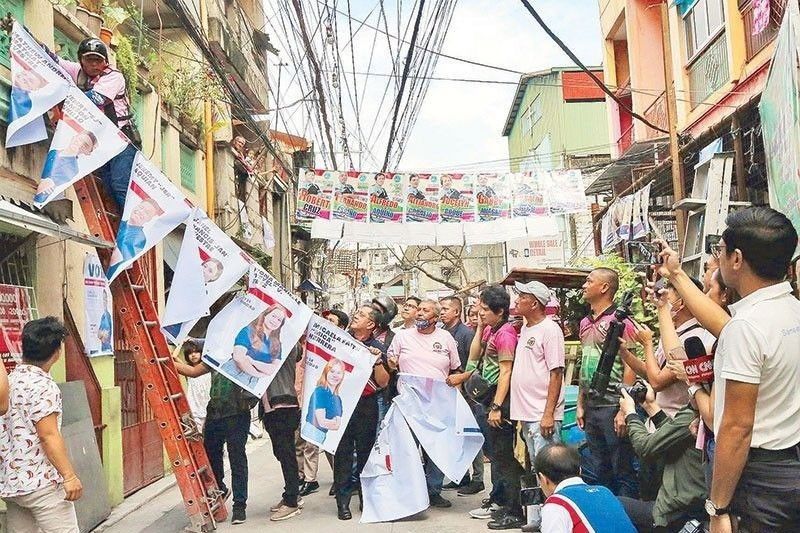Comelec urges LGUs: Take down campaign materials

MANILA, Philippines — The Commission on Elections (Comelec) has asked for the assistance of local government units (LGUs) in taking down campaign materials that violate local policies and regulations.
In an interview with “Storycon” over One News on Thursday, Comelec Chairman George Garcia said their hands are still tied in terms of regulating materials bearing the names and images of those who have already filed their certificates of candidacy for the 2025 elections.
He cited a Supreme Court ruling declaring that individuals only become candidates at the start of the official campaign period, which will be on Feb. 11 for national candidates and March 28 for local candidates in next year’s polls.
The ruling effectively removed the concept of premature campaigning and allowed aspirants to still endorse products or post banners or greetings, such as during this holiday season.
Garcia, however, said LGUs can implement their own policies particularly on the environment to remove materials that are clearly being used for campaigning.
“I appeal to our LGUs. I hope that you will not disregard the situation because not all of your constituents are happy seeing those things on the streets,” he said in Filipino.
But since Comelec rules still do not apply, the removal of these materials should be based on local policies, such as the prohibition on the placement of materials on electric posts and wires and in other public places.
The Comelec on Wednesday released the rules and regulations governing campaign activities for the 2025 midterm elections.
Among its provisions is the requirement for candidates to remove all prohibited forms of election propaganda 72 hours before the start of the campaign period.
It covers “any names, images, logos, brands, insignias, initials and other forms of identifiable graphical representations on any public structures or places.”
During the interview, Garcia admitted limitations in regulating even traditional campaigning.
For instance, he noted another Supreme Court ruling stating that the poll body has no jurisdiction over campaign materials in private properties.
This, he said, may be used as a loophole by candidates who have the resources to put up large signs inside private properties.
Garcia also noted violations in the use of common poster areas, such as when supporters of rival candidates remove each other’s campaign materials.
The new policy also urged candidates to use environment-friendly and recyclable materials in their campaign.
“We have to protect the environment. A campaign should not be used as a license to violate rights of others, such as their right to a clean environment,” Garcia said.
Regulating socmed
Meanwhile, Garcia admitted challenges in regulating the use of social media in the upcoming elections.
Garcia urged lawmakers to pass a law that would set the limits of digital campaigns used during elections.
“We cannot limit that because there is no law… We hope that in the future, we will have a law that will regulate social media, even just during the period of the campaign,” he said in Filipino.
“Running (for public office) is not an absolute right, it’s a mere privilege. Therefore, it’s really subject to regulations,” he added.
Last September, the Comelec issued a resolution providing for the guidelines on the use of social media, artificial intelligence and internet technology for digital campaigns.
It prohibited certain acts, such as the use of “false amplifiers,” coordinated inauthentic behavior, creation and dissemination of “deepfakes” and the use of fake and unregistered social media accounts.
The poll body also mandated the registration of all official social media accounts, pages, websites, podcasts, vlogs and other online and internet-based campaign platforms to be used by candidates.
One provision of the resolution – which required the registration of private individuals such as influencers who support a candidate – was removed by Comelec following concerns of overreach.
Garcia recognized that the policy may be “bordering on unconstitutionality” as the support of a private individual to a candidate is covered by freedom of speech and expression.
“That’s where influencers come in. There is no law defining who are these social media influencers,” he said, making it impossible to determine if they are being paid to support a candidate or they are merely expressing their support.
The poll body chief said they are in close coordination with social media platforms to try to regulate election-related activities in their respective sites.
But he urged Congress to pass the necessary laws so the Comelec would not have to appeal to platforms for their support in regulating digital campaigns.
Exemptions
The Comelec has identified 49 infrastructure projects that are exempted from public works spending ahead of the May 2025 midterm polls.?
A Certificate of Exception that Comelec released yesterday said, “This is to certify that the following infrastructure projects of the Public-Private Partnership (PPP) Center are not covered by the ban on public works provided under Section 261 (v) (1) of the Omnibus Election Code and in relation to Comelec Resolution 11078.”
Some of these projects include the UP Philippine General Hospital Manila Cancer Center Project, the UP Philippine General Hospital Diliman Project, the UP Los Baños Agro-Industrial Information Technology Parks “Agrifutura” Project, San Juan Pambansang Pabahay Para sa Pilipino (4H) Program, Manila Central Post Office Project, the Rizal Park Western Section Development Project, Mt. Data Hotel Project, Aquilino Q. Pimentel Jr. International Convention Center, Metro Manila Subway Project Operations and Maintenance PPP Project and Metro Rail Transit Line 3 Operations and Maintenance. — Rhodina Villanueva
- Latest
- Trending




























